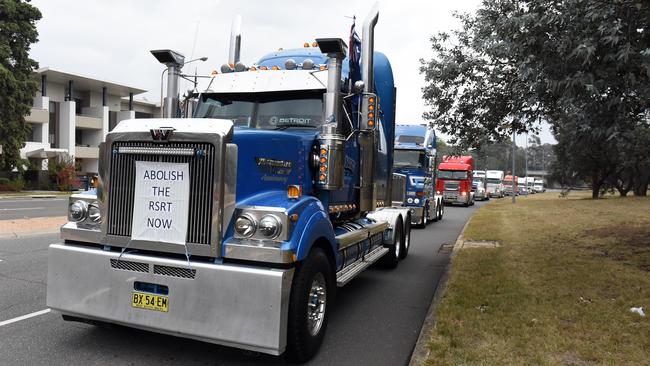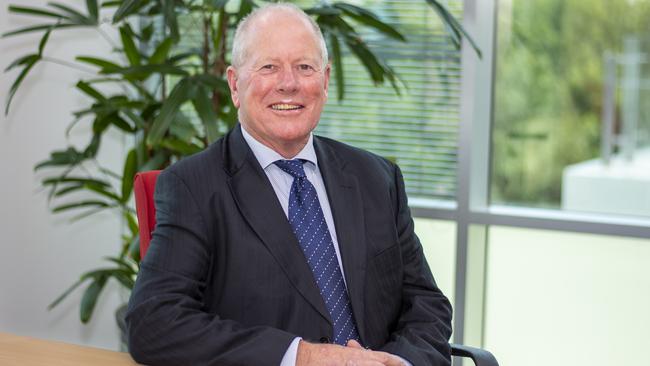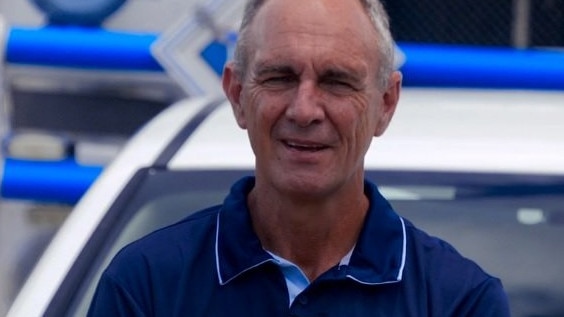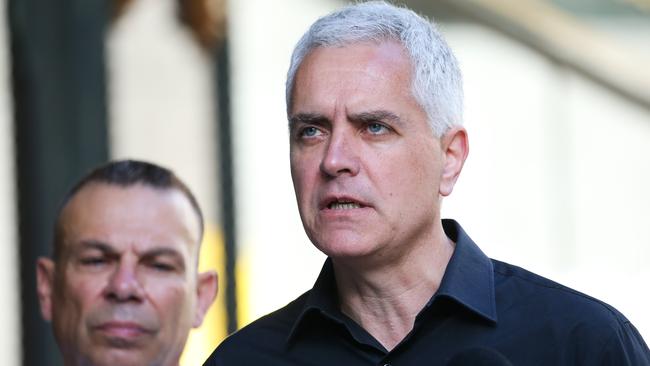Truckies want to be in loop on new industrial crackdown
Truckies have told Workplace Relations Minister Tony Burke not to repeat the mistakes of the Road Safety Remuneration Tribunal in its new industrial crackdown.

Truckies have told Workplace Relations Minister Tony Burke not to repeat the mistakes of the Road Safety Remuneration Tribunal in its new industrial crackdown, warning against uncompetitive rates that target 35,000 owner-drivers and force them out of business.
The pushback from the trucking industry – which wants the government to put working drivers at the heart of consultations – comes after The Australian revealed plans to resurrect RSRT powers by enabling the Fair Work Commission to enforce minimum safety and entitlements standards for the road transport sector.
Australian Trucking Association chair David Smith said the RSRT, set-up by the Gillard government in 2012, unfairly targeted owner-drivers and left them emotionally broken.

“I just hope both sides of this debate have learnt a hell of a lot since RSRT 1, which was a debacle. I could use a lot stronger words than that. I had grown men, successful businessmen in their own right, on the phone bawling to the point where they couldn’t even talk,” he said.
The South Australian truck operator, who has more than 40 years experience as a driver and business owner, said if the RSRT reboot “focuses on the issues that matter, industry will be more than happy to sit at the table and have a meaningful discussion”.
“(It must) focus and concentrate on fairness and industry sustainability. But don’t limit it or interfere with operators or commercial decisions regarding their own rates. The minute we set minimum rates, it becomes the rate,” he said.
Industry sources warned that payment orders, which led to the Coalition abolishing the RSRT in 2016, were unworkable given the diversity of the sector and different operating conditions across the country.
The Weekend Australian understands the Transport Workers’ Union and Mr Burke are working to avoid the perverse outcomes of the RSRT, which failed to deliver a long-term solution for truckies.
Skyrocketing maintenance, vehicle, fuel and AdBlue costs, gig economy competition, poor road infrastructure and increased workloads, which soared during the pandemic, are fuelling the government’s road transport IR reforms.
National Road Freighters Association president Rod Hannifey said he was “virtually the only driver” to be involved in the government’s roundtable talks, which took place late last year.

“I was the only employed truck driver there. In my view on the RSRT, and I think many of my colleagues agree with me … someone said, ‘hey we can’t have transport being dearer let’s find a way to hijack this’ and they split the industry down the middle – between drivers and owner-drivers,” Mr Hannifey said.
He said the government’s consultation process, which offered a second chance to get it right, must avoid the RSRT model where “they told us what they were going to do”.
“We have to have drivers involved. There are some in the industry who do really well. There are big companies that screw little blokes. The pressure that we are hearing from some of our members is more than it has ever been,” he said.
TWU national secretary Michael Kaine said the “dog-eat-dog status quo of our industry is not only undesirable, it is unsustainable for all participants”.
“This is widely felt across the industry, and has been shared with the government through extensive consultation. Since 2016, the gig economy has fired a bazooka at industry norms, largely by abusing ‘independent’ contracting provisions to sidestep decent conditions,” Mr Kaine told The Weekend Australian.

“This, along with total inaction from the former government, has tightened margins, smashed incomes, left businesses insolvent, and further undermined safety in what is already the nation’s most lethal occupation.”
Mr Kaine said opposition workplace relations spokeswoman Michaelia Cash, who on Thursday accused the government of “putting the interests of its union paymasters above the interests of small and family businesses”, was “out of the loop or wilfully blind”.
“The industry has come together to design a fair market with fair, safe and sustainable standards to prevent an unfair one foisted upon us by Amazon.”
Opposition transport spokeswoman Bridget McKenzie said the government must “engage directly with truck owner-drivers in a genuine way (and) demonstrate there will be no detrimental impacts on truck owners”.







To join the conversation, please log in. Don't have an account? Register
Join the conversation, you are commenting as Logout